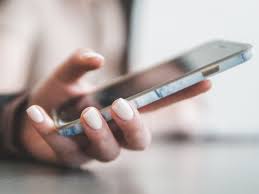Friday, November 18, 2022
Antiwar Voices
Wednesday, November 16, 2022
EOTO: What I learned...
The Invention of Bluetooth
We all already knew that bluetooth is on our cell phones, laptops, Apple TV's, etc, but I was surprised to find out that bluetooth is also in hearing aids, refrigerators, and pacemakers. Bluetooth was created in 1994 by the Swedish multinational telecom vendor L.M. Ericsson.
Today, bluetooth is most often used to connect our gadgets cordlessly such as mirroring our phone screens onto our TV's and connecting our phones to our cars for music and handsfree access to our cell phones. Other devices that we don't think about bluetooth being in is our security systems, remotes controls, watches, toys, and even our washing and drying machines.
Friday, November 11, 2022
EOTO: The Telephone
The Invention of the Telephone
The invention of the telephone cut down the amount of time that it took to communicate with someone. When sending a telegraph, it took weeks for the message to be relayed while the telephone was instant. The telephone allows for immediate and personal type of communication which can not be obtained through any other medium.
One of the biggest impacts that the telephone had on society was it helped businesses.Telephones were most useful for businesses since the invention made for instant communication, businesses could get in touch with other businesses quickly which made networking grow. Telephones allowed people to talk business and negotiate contracts more quickly and efficiently. The invention also allowed businesses to grow a wider client list because they were now able to talk to clients from all around the world.
This invention also sparked other inventions such as cell phones. Telephones have been evolving from 1876 to present day. The evolution includes the first telephone in 1876, the Frankfurt "Bauhaus" telephone in 1925, the Motorola DynaTAC 8000x in 1983, and the first iPhone in 2007 which we still use today. A more in depth list of the evolution of telephones can be found here from CBS News.
Although the invention had many positive effects it also had some negative ones such as face to face communication was drastically decreased, conversations could be intercepted by our government, and many were afraid that the technology could hurt them which is still an ongoing debate today.
The telephone has become the most widely used communications device in the world. About 91% of the world’s population owns a cell phone today. We are now able to use our cell phones to communicate with anyone in the world, get our news, and post on social media. Without alexander graham bell’s invention we may not be carrying around apple and android cell phones today.
Sources:
Borth, David. “Telephone.” Encyclopædia Britannica, Encyclopædia Britannica, Inc., 2022, https://www.britannica.com/technology/telephone#:~:text=telephone%2C%20an%20instrument%20designed%20for,obtained%20through%20any%20other%20medium.
Library of Congress, Science Reference Section. “Who Is Credited with Inventing the Telephone?” The Library of Congress, 2022, https://www.loc.gov/everyday-mysteries/technology/item/who-is-credited-with-inventing-the-telephone/
Mitel. “History of the Telephone and Communication with Businesses.” History of the Telephone and Communication with Businesses , https://www.mitel.com/articles/history-telephone-and-communication-businesses
Ngak, Chenda. “The Evolution of Telephones.” CBS News, CBS Interactive, 1 Dec. 2014, https://www.cbsnews.com/pictures/the-evolution-of-telephones/
Some Ways Of Changing The World By Telephone. (2022, February 27). Edubirdie. Retrieved November 9, 2022, from https://edubirdie.com/examples/some-ways-of-changing-the-world-by-telephone/
Wednesday, November 2, 2022
The First Amendment and 8 Values of Free Expression
The First Amendment
 The First Amendment states "Congress shall make no law respecting an establishment of religion, or prohibiting the free exercise thereof; or abridging the freedom of speech, or of the press; or the right of the people peaceably to assemble, and to petition the Government for a redress of grievances."
The First Amendment states "Congress shall make no law respecting an establishment of religion, or prohibiting the free exercise thereof; or abridging the freedom of speech, or of the press; or the right of the people peaceably to assemble, and to petition the Government for a redress of grievances."
This gives Americans the freedom from religion, of religion, speech, press, assembly and petition. The most important thing the first amendment protects, is your freedom to criticize the government.
The 8 Values of Free Expression
- Marketplace of Ideas (aka Discovery of Truth)
- Participation in Self Government
- Stable Change (aka Safety Valve)
- Individual Self-Fulfillment (aka Self-Actualization)
- Check on Governmental Power (aka Watchdog Role)
- Promote Tolerance
- Promote Inovation
- Protect Dissent
Check on Governmental Power
If there is one thing that our generation relies on, it is social media. On average, Americans spend 2 hours and 27 minutes a day on social media. About half of U.S. adults say they get their news from social media "often." What most Americans don't know is recently the government has been trying to censor what we see on social media.
A popular social media platform, TikTok, has recently had "false information" flags on videos that talk about politics and other controversial issues. If you click this flag is says something along the lines of "fact checkers have flagged this video for misleading information."
A recent article in the Washington Post states "TikTok said in its most recent "transparency report" that government authorities had asked it to remove or restrict more than 400 videos or accounts last year." The theory is that government has actually been putting these "false information" flags, or making TikTok put these flags on post they don't want Americans to see.
Additional flags like this one has also been added to TikTok when trying to share a video that has been flagged.
An article from TechCrunch states "TikTok this morning announced a new feature that aims to combat the spread of miss information on its platform. In addition to removing videos that are identified to be spreading false information, as verified by fact checking partners, the company says it will now also flag videos were fact checks are inconclusive."
If the government is in fact trying to limit what we see online and what we can post, it is a violation of the first amendment's freedom of the press. It is our duty as Americans to call the government out on things like this and criticize them on things that we don't agree with. The theory of Check on Governmental Power helps explain this issue of censorship on social media going on right now.
Supreme Court
The U.S. Supreme Court
Final Post
My Relationship With Technology The little devices that we use everyday hold so much power over us. Instead of being in the present we are...

-
Five Eyes After listening to Maddie Berl's presentation on five eyes (something I had never heard of before) I was very intrigued to le...
-
The Telephone The telephone is one invention that changed the world and opened a wide world of communication. Before the invention of tele...
-
Antiwar Voices After exploring antiwar.com and The American Conservative , I found that I have never heard these positions and opinions bef...
















